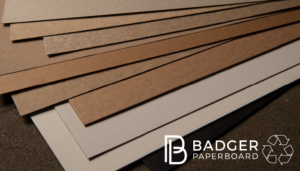Thank You!

 Did you know that paper and paperboard materials are the largest solid component of municipal landfill waste?
Did you know that paper and paperboard materials are the largest solid component of municipal landfill waste?
Here at Badger, sustainability isn’t just a buzzword – it’s how we do business.
“We’re a paperboard converter,” said Jeff Gauger, General Manager at Badger’s Wisconsin facility. “That means we don’t manufacture paperboard, but we buy it from mills that manufacture it. And one of the primary grades of paperboard that we convert is called chipboard. Chipboard is a paperboard product that is made completely out of recycled fiber, typically a mix of post-consumer and pre-consumer recycled materials. So it’s practically the definition of sustainability!”
The recycled chipboard is then broken down and converted into sheets, pads, corner board, and other materials used for packaging applications. Any leftover material generated in the conversion process – any scrap or waste – is also cut up, baled, and sold right back to the mills for reuse. It’s one big, sustainable circle that is great for business and for the environment.
Badger has also cut costs and gained efficiencies at its Wisconsin facility by adjusting work shift cycles. The first shift runs four days a week, with 10-hour working days. Second shift runs three days a week, with 12-hour working days. Both teams are paid for a full 40-hour week, but by staggering shifts this way, the production part of the plant goes dark at off times. No lights go on and no machinery is operated, which saves on energy consumption.
Additionally, lighting systems and production equipment upgrades are all made with sustainability in mind. For instance, the Wisconsin plant has upgraded from gas-powered forklifts to electric forklifts, which are much more efficient. They also recycle pallets whenever possible.
“A number of years ago, we started a program of what we call a role of valuation,” said Gauger. “We purchase with very specific criteria in mind, with a focus on minimizing waste, scrap, and how much cutting we have to do. It becomes a more efficient process, and ultimately that results in a savings on energy consumption, waste, and money.”
Employees at Badger are encouraged to take an active role in identifying areas where the company can be more efficient and sustainable, as well.
“We have an environmental management system,” says Gauger. “We do some training on it every year with all of our employees in the plant. They’re looking at each process for efficiencies. What can we eliminate, or can we refine or tweak, so that we’re saving money, saving energy, time, whatever it might be? So we’re always evaluating those processes and the products that we use to see if we can do anything better. We don’t set targets or goals – it’s a process of continuous improvement.”
Badger continues to strive for a zero-waste future. The combined impact of all of these efforts results in the recycling of more than a million pounds of paper per year! This saves approximately 3.5 million gallons of water, 2 million kWh of electricity, 8,500 trees, 1,500 barrels of oil, and 44,550 cubic feet of landfill space.
Ready to get a quote? Support a sustainable future when you buy from Badger! Get a quote online here, or give us a call at one of our locations.
This blog was originally posted April 16, 2021. It was updated in August 2023.